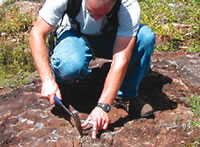 With mining prices soaring and interest in local exploration reaching a fever pitch, the Timmins Economic Development Corporation is looking to the potential of creating a mining incubator for the region.
With mining prices soaring and interest in local exploration reaching a fever pitch, the Timmins Economic Development Corporation is looking to the potential of creating a mining incubator for the region.
In fact, with 91 exploration companies currently operating in the Timmins area, measures need to be taken to continue to foster this type of work, says Christy Marinig, CEO of the TEDC.
“We need to be able to help them expand their opportunities,” says Marinig.
The idea is to eventually create a unique, standalone facility which would house any number of services that would help to maintain and increase the level of mining activity in the region, she says.
While the details are still being developed, Marinig anticipates it may well assist companies in navigating the many pitfalls involved with exploration, including assistance with seeking financing and possibly space for storage, offices, or other purposes.
However, its real value is expected to be in its ability to act as a network, allowing participating companies to share resources and strategies for the supply of labour and equipment. The benefit would extend not only to the local exploration camps, but also to outlying communities, with the inclusion of the likes of Kirkland Lake and Hearst in the project.
However, the exact size, location and even internal components are still up in the air, as the TEDC is still in the early stages of determining the perceived level of need from within the community.
Surveys have already been developed and sent out to mining-related businesses throughout the Timmins region in order to draw out feedback on the project. Results are expected to be received by mid-summer. Marinig says this project fits in with the Discover Abitibi project, which is also being coordinated by the TEDC.
This regional geoscience mapping initiative recently kicked off its fifth phase, with an eye on doing work on under-explored portions of the Abitibi Greenstone Belt and beyond.
By providing exploration firms with geophysical data as well as the tools to simplify their work and to foster their development, the project has the potential to not only attract more juniors, but also to improve ones already operating in the area.
What’s more, the project could eventually be used to feed into various future efforts related to the development of a strong mining cluster.
Regardless of whatever shape the project may take, Robert Calhoun, manager of the Discover Abitibi project, agrees that a regional exploration support centre would be a positive development for the local mining industry. He argues that such efforts would also serve to promote the city and further expand its base of exploration firms and other mining interests.
While many juniors working in the northeast are based out of Vancouver, providing benefits to the community through hotel use and rental of space, an exploration centre would make the city even more attractive by potentially providing a place to log core and serve as offices.
It may also encourage the return of juniors who previously left after their work had proved fruitless, as the sharing of information and development could prove sufficiently enticing.
“Hopefully they’ll come back, provided the price of metals stays high,” Calhoun says. “Nothing brings them back faster than evidence of success.”
In the meantime, the TEDC is looking to other means of assisting the mining industry with its need for manpower.
With the shortage of skilled workers hitting Timmins every bit as hard as the rest of Northern Ontario, officials have begun to assemble a database of retirees in the region.
Given that some individuals prefer to ease into retirement rather than cutting out work altogether, this project may allow them to act as consultants or short-term contractors, working at their whim. Although this, too, is still being developed, it is expected that interested retirees will sign themselves up, providing their contact information, skillset and availability.
“It might just be for five hours a week, it might be for 10 hours a week, but every little bit helps the company with its shortage,” Marinig says.
www.timminsedc.com
www.discoverabitibi.com


.jpg;w=120;h=80;mode=crop)